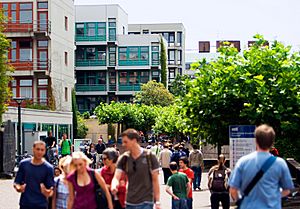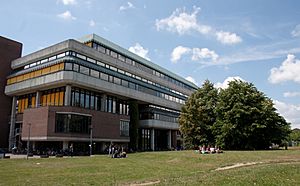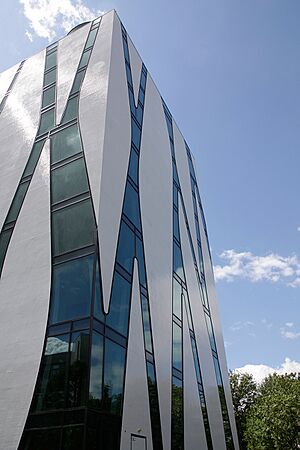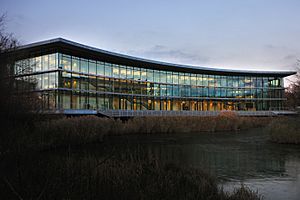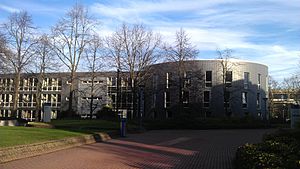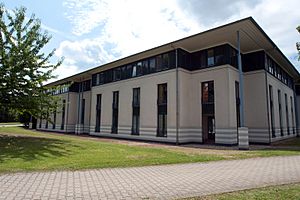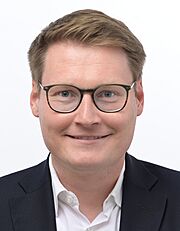Heinrich Heine University Düsseldorf facts for kids
|
Heinrich-Heine-Universität Düsseldorf
|
|
 |
|
| Motto | Life. Nature. Society |
|---|---|
| Type | Public |
| Established | 1965 |
| Budget | €279 million |
| Rector | Anja Steinbeck |
|
Academic staff
|
2,252 |
|
Administrative staff
|
1,403 |
| Students | 36,569 |
| Location |
,
Northrhine-Westphalia
,
Germany
51°11′25″N 6°47′39″E / 51.19028°N 6.79417°E |
Heinrich Heine University Düsseldorf (HHU) is a public university in Düsseldorf, Germany. It was founded in 1965 and is named after the famous German poet Heinrich Heine. The university started as a Medical Academy in 1907.
Over the years, HHU has grown a lot. Since 1993, it has five main schools, called faculties. Today, more than 36,000 students study at HHU, and about 3,600 people work there.
Contents
University History
Heinrich Heine University began as the Düsseldorf Academy for Practical Medicine in 1907. It became a full university in 1965 when new faculties for Natural Sciences and Arts were added to the existing medical one.
Just four years later, the university split the combined faculty into two separate parts: the Faculty of Arts and Humanities and the Faculty of Mathematics and Natural Sciences. A modern University and State Library opened in 1979, and a sports center was added in 1980/81.
In 1989, the university was officially named after Heinrich Heine, a famous poet from Düsseldorf. After this, the university campus became more open to the city and its people. The Faculty of Business Administration and Economics opened in 1990, followed by the Faculty of Law in 1993.
Campus and Buildings
HHU's campus is shaped like a triangle and is located in the southeast part of Düsseldorf. It is next to the university hospital campus, and together they cover a large area of about 1.3 million square meters.
New buildings have been added to the campus, like the Student Service Center (SSC). There is also the modern Oeconomicum building for Business Administration and Economics, and the O.A.S.E. library for medical studies. The O.A.S.E. is one of Germany's most modern places for students to study alone or in groups.
University and State Library
The ULB Düsseldorf is one of the main state libraries in North Rhine-Westphalia. It is known for its excellent services and large collection of books and resources. The library collects and keeps scientific materials for the university and regional literature for the state.
Centre for Information and Media Technology (ZIM)
The ZIM is a central part of HHU that helps with digital information and technology. It provides services for digital communication and digital media.
Botanical Garden
The Botanical Garden of Düsseldorf is a scientific garden at HHU. It has about 6,000 different kinds of plants from all over the world. The garden is open to visitors all year.
What You Can Study: Faculties
HHU has five main faculties, which are like different schools, where students can study various subjects.
Medicine
The Medical Faculty is one of HHU's largest, with over 3,000 students. You can study Medicine and Dentistry here. There are also master's programs in Toxicology and Public Health.
Students who want to do advanced research can join the Medical Research School Düsseldorf. This school helps graduate students and their teachers with networking and advice.
Arts and Humanities
This is HHU's biggest faculty, with about 8,000 students. It offers many different programs, including 26 bachelor's and master's degrees.
One special program is the M.A. in European Studies, which is taught in English. It's for students from Israel, Palestine, Jordan, and other countries. There's also a German-French master's program in Media Culture Analysis, where students can get a double degree from HHU and the University of Nantes.
Mathematics and Natural Sciences
This is HHU's second largest faculty, with about 6,500 students. It offers many programs in science and math.
Some special programs allow students to study abroad for a year, for example, at Michigan State University in the US or the University of Western Australia in Australia. There's also an international master's program in Biology.
The faculty supports students doing their doctoral studies through iGRAD, which helps with training and advice.
Business Administration and Economics
This faculty has about 1,100 students and is located in the modern Oeconomicum building. You can study Business Administration, Economics, and Business Chemistry here.
For those who want to continue their education, the Düsseldorf Business School offers MBA programs. These include General Management and Health Management.
Law
The Faculty of Law offers practical courses for students who want to become lawyers. They work with local courts to give students real-world experience.
A unique program is the German-French law course, offered with the Cergy-Pontoise University in France. This program allows students to study both German and French legal systems. After three years, students get degrees from both countries. There's also a two-year program for students to specialize in business, labor, and employment law.
The faculty also offers extra courses in Anglo-American law. For further education, the Düsseldorf Law School provides master's degrees in areas like commercial rights and medical rights.
How the University is Run
The President's Office
Heinrich Heine University Düsseldorf is a public university in the state of North Rhine-Westphalia. It is managed by the rectorate, also called the president's office. This team includes the president, four vice-presidents, and the chancellor. Since November 2014, Professor Anja Steinbeck has been the president of HHU.
The University Council
The University Council has eight members, some from inside the university and some from outside. They advise the president's office and check how the university is managed.
The Senate
The Senate is where different groups at the university can discuss important topics. Its members are chosen by the university community. The senate helps guide the university's development and confirms the elected members of the president's office.
Student Representation
Students at HHU have their own ways to be heard. The student parliament is the highest group for all students. The AStA (Allgemeiner Studierendenausschuss) is the main group that represents students' interests in university politics. Also, each academic subject has a student association to help students in that field.
International Connections
International Study Programs
HHU offers several degree programs taught in English. These include English Studies, Comparative Studies in English and American Literature, and European Studies in the Arts and Humanities faculty. The Faculty of Mathematics and Natural Sciences offers international master's programs in Biology and Physics.
International Partners
HHU works with many universities around the world, especially in Europe, the United States, Japan, and the Near East. It has over 13 collaborations with other universities and more than 140 Erasmus partnerships, which allow students to study abroad.
Student Life
The Student Service Centre (SSC) offers advice and help to students.
Students can enjoy many sports activities, organized by the students' representation (AStA) of Düsseldorf's universities. They offer about 100 different sports, workshops, and sports holidays.
For music lovers, there are events like Local Heroes for local bands and jam sessions. The university also has a semi-professional orchestra. Each year, a short film competition for young talents takes place on campus.
There are many student groups and clubs, such as a local UNICEF group, a debating club, and a campus radio station.
Since 1989, the Heinrich Heine Guest Lecture has brought famous speakers to the university, like Marcel Reich-Ranicki and Helmut Schmidt. These guest professors give talks to the public on important topics.
Study Fees and Scholarships
As a public university in Germany, HHU does not charge tuition fees. However, students pay a small service charge each semester (around 230 Euros in winter semester 2012/13). This fee covers costs for student services like housing, food, and a semester ticket for free rides on local trains and buses.
Many scholarships are available to help students with living costs, studying abroad, or finishing their final projects. HHU is one of the top universities in Germany for providing scholarships.
Notable Alumni
- Patty Gurdy (born 1997), musician and YouTuber
- Moritz Körner (born 1990), politician
- Johann-Mattis List (born 1981), scientist
- Heino Meyer-Bahlburg (born 1940), psychologist
- Peter Philipp (1971–2014), writer and comedian
- Bernhard Sabel (born 1957), brain researcher
- Monika S. Schmid (born 1967), linguist
- Günter Theißen (born 1962), geneticist
- Larisa Velić (born 1973), Judge
University Rankings
| University rankings | ||||||||||
|---|---|---|---|---|---|---|---|---|---|---|
| Overall – Global & National | ||||||||||
|
||||||||||
In 2024, the QS World University Rankings placed Heinrich Heine University among the top 801–850 universities worldwide, making it the 43rd best in Germany. The 2024 THE World University Rankings put HHU in the 251–300 range globally, ranking it between 25th and 31st nationally. Also, the 2023 ARWU World University Rankings listed the university in the 301–400 global group, which means it was between 20th and 24th in Germany.
See also
 In Spanish: Universidad de Düsseldorf para niños
In Spanish: Universidad de Düsseldorf para niños


